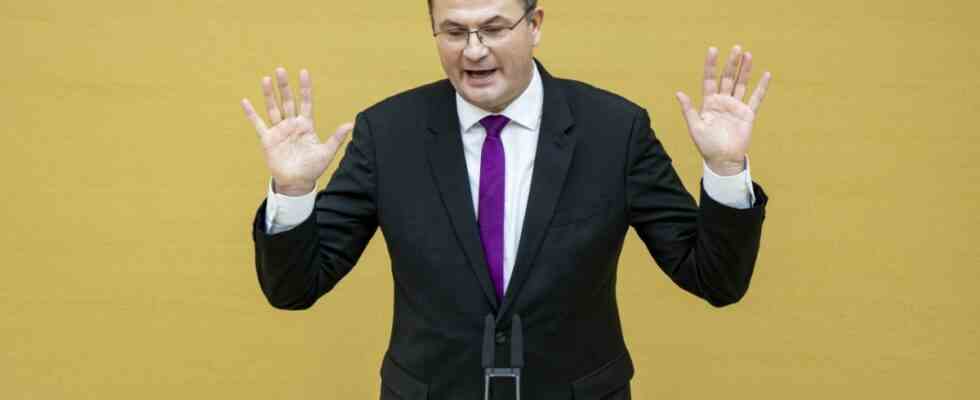A budget debate in the state parliament does not promise hours of entertainment per se, if only because the matter is complicated. After all, there is a lot of money at stake, everything that the state government wants to take in and spend, distributed across countless budget titles in 16 individual plans. The cabinet and government factions generally consider this to be a brilliant work, while the opposition senses waste here and fears shortages there. So far, so predictable.
Nevertheless, the discussion about the finances is essential, because sovereignty over the budget is Parliament’s most important right. Even if Bavaria likes to look – and of course it should – as if the prime minister himself distributes the money, flanked by the loyal finance minister Albert Füracker. And it is somehow the case in the end, right at the beginning of the debate, which will go on for several weeks, the majority of CSU and Free Voters leave no doubt that they will approve the finance minister’s draft budget.
The budget for 2023, which was discussed in the first reading in the state parliament on Wednesday, includes 71 billion euros. Füracker does not present a double budget, as is often the case, the situation is too uncertain in view of the war and the onset of recession. The minister used his speaking time for a detailed criticism of the policy of the traffic light government in Berlin. The federal budget includes “zero concept, zero perspective and endless debt,” said Füracker. He criticized decisions from Berlin that the federal states would have to co-finance without being asked, and grumbled about energy subsidies, which would mean that more energy would have to be produced in Germany – from wind power, he conceded, but “we will also need fuel, oil and fossil fuels for many years to come.”
Federal Finance Minister Christian Lindner (FDP) did not get away without being blamed, taking on 400 billion euros in new debt and claiming to comply with the debt brake. Bavaria, on the other hand, presents a budget without new debt. However, Füracker had to withdraw 3.5 billion euros from the reserves. That hardly stood in the way of self-praise, the minister spoke of crisis management. 28 percent of the total expenditure went directly or indirectly to the municipalities – municipal financial equalization and key allocations have never been so high. He had more records to announce, as befits a presentation like this.
The state election campaign is not far away, it has already started in part, and there is no denying that just a few days before Christmas. The election date was set for October 8th and until then the CSU will use a lot of energy to make the contrast between Bavaria and the federal government appear as drastic as possible – with the not very subtle message of where better politics is made. It will often be about money.
The traffic light parties must represent the opposite. One of the exciting questions will be whether the SPD, Greens and FDP can benefit from government participation in Berlin. Either way, the opposition also used the budget debate for general criticism. The expansion of wind power is progressing too slowly, said Greens budget expert Claudia Köhler, and the state government’s hardship fund is being misused for election gifts.
There is talk of a “baroque campaign budget”.
The state government is providing 1.5 billion euros for the consequences of the energy crisis, for what exactly is still unclear. This is again justified with a reference to Berlin, only when it is clear what the federal government will step in for can Bavaria follow with its own program, it is said. The opposition is particularly agitated that the details, once they are certain, should not be decided by parliament, for example in a supplementary budget. Rather, the CSU and Free Voters want to grant a so-called emergency authorization right with an emergency application, so that the state government may have to consult the budget committee and otherwise be able to dispose of the money quite freely. “They abuse our constitutional bodies, they bypass parliament,” Köhler complained.
The SPD finance expert Harald Güller agreed with her and accused the government factions of wanting to undermine the budget law. The hardship fund has been haunting state politics for weeks like a mirage, but the result is sobering. He has only planned two specific things so far, doubling the club fee and granting an additional 400,000 euros for the food banks in Bavaria – both proposals from the SPD that the government majority had previously rejected.
A “baroque campaign budget,” Güller called the finance minister’s draft, which serves to secure the power of the CSU.
Helmut Kaltenhauser from the FDP referred to the so-called faction reserve, which had increased from 30 to 70 million euros. The members of the governing factions are allowed to spend this money, and as a rule every member of parliament receives a small sum with which he can prove his assertiveness at home in Munich and increase his own fame. For the good of the homeland, of course. Kaltenhauser suspected it was pure coincidence “that in the election year of all times no debts are incurred and reserves are used”.
Ferdinand Mang from the AfD added that the reserves would be spent on “useless green crap”, while Josef Zellmeier for the CSU and Bernhard Pohl for the Free Voters vigorously defended the budget. The Greens “as always are completely misinterpreting the budget” and couldn’t do it in either Berlin or Bavaria, Zellmeier said and Pohl assisted that replacing the CDU/CSU in the federal government made things not better but “much, much worse”. have.
So far, so predictable. The details of the draft budget are now being discussed in committee and finally brought back to the plenary for the second reading. Even the noblest right is not per se glamorous.

